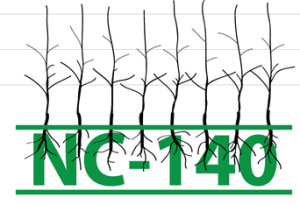
NC-140 Regional Rootstock Research Project logo
The multidisciplinary, multistate NC-140 Regional Research Project Improving Sustainability in Fruit Tree Production through Changes in Rootstock has received the U.S. Department of Agriculture’s 2015 Experiment Station Section Excellence in Multistate Research award.
The multistate research program allows state agricultural experiment stations to interdependently collaborate on projects that two or more states share as a priority, but that no one state could address alone.
The award recognizes scientists who are conducting exemplary multistate activities and research under the program.
The NC-140 project, a partnership of more than 30 universities and organizations in the U.S., Canada and Mexico, seeks to enhance economically and environmentally sustainable practices in temperate fruit production by focusing on rootstocks.
Over the past five years, NC-140 researchers have measured tree growth, size control, and pest and disease resistance in order to develop the most sustainable rootstocks and to accelerate the process of identifying and commercializing high-performing rootstocks for growers.
Overall, the NC-140 group reported that its research and recommendations have resulted in earlier returns, greater yields and higher fruit quality, with a financial benefit to U.S. fruit tree producers of $250 million.
For instance:
—Ninety-eight percent of all New Jersey orchards now use apple, pear, peach and cherry dwarfing rootstock.
—In Indiana, grower use of rootstocks from NC-140 trials has increased by 660 percent, with an estimated crop value increase of more than $12,000 per acre.
—Nationwide, sweet cherry acreage has increased by 10,000 acres since 1995, and planting density has increased from 100 to 415 trees per acre.
—In the apple industry, NC-140 science and outreach has increased mature orchard yields by 20 percent, enhanced fruit size by 10 percent and increased highest grade fruit by 20 percent.
NC-140 is supported in part through USDA’s National Institute of Food and Agriculture and has been renewed until 2017 to continue to support the fruit tree industry and its growers.






Leave A Comment